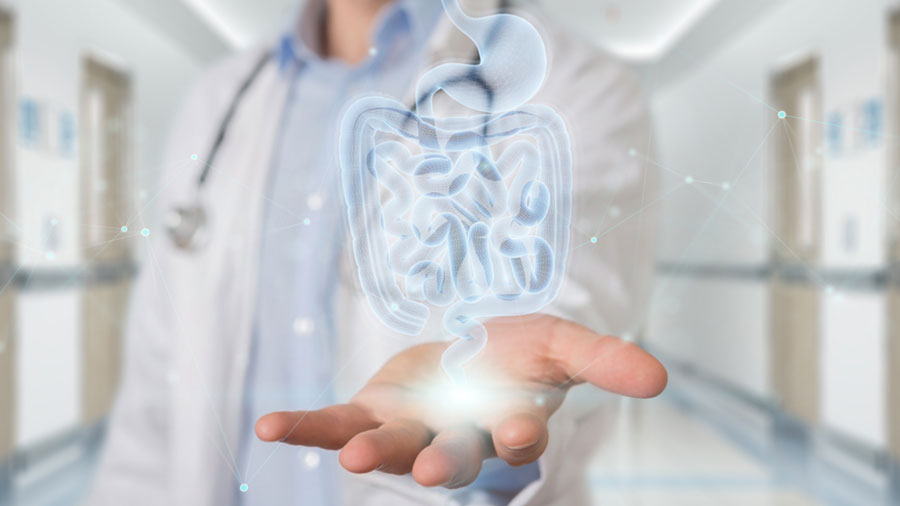
Gastroenterology
The Department of Gastroenterology and Hepatology diagnoses and treats diseases of the stomach, duodenum, small intestine, large intestine (colon) and anus, starting from the esophagus. This unit also covers diseases of the pancreas, gallbladder, and ducts. The second main subject is liver diseases. It deals with diagnosis and treatment of diseases of these organs such as ulcer, gastritis, jaundice, hepatitis, cirrhosis, spastic colon, gallbladder stones and inflammation, ulcerative colitis, Crohn’s disease, constipation, diarrhea, rectal and oral bleeding, hemorrhoids (hemorrhoids), digestive system cancers. To summarize, the organs that are part of the digestive system and their disorders are the fields that make up the diagnosis and treatment of Gastroenterology and Hepatology.
- Gastroscopy
- Endoscopic treatment of gastric and duodenal bleeding
- Treatment of esophageal varix
- Dilatation procedures
- Gastroscopy in reflux disease
- 24-hour pH monitoring and impedance
- Esophagus manometer
- Capsule endoscopy
- Gastric Balloon
- Feeding tube insertion (PEG)
- Colonoscopy and sigmoidoscopy
- Polypectomy
- Hemorrhoid treatment (sclerotherapy and ligation)
- Rectal manometer
- Liver diseases, viral hepatitis, jaundice, cirrhosis
Treatments and Procedures Performed in the Department of Gastroenterology;
- Diagnosis and treatment of esophageal diseases
- Diagnosis and treatment of gastrointestinal diseases
- Diagnosis and treatment of gallbladder and duct diseases
- Diagnosis and treatment of liver diseases (hepatitis, cirrhosis, etc.)
- Diagnosis and treatment of pancreas diseases
- Gastroscopy, Colonoscopy, Rectoscopy (Endoscopy procedures) applications
- Non-surgical removal of polyps (Polypectomy, mucosal resection)
- Opening and widening of esophagus and stomach strictures with balloon or bougie
- Band therapy in esophageal varix
- Sclerotherapy, argon plasma coagulation, clip treatment in bleeding ulcers
- Stent placement in the esophagus, stomach, large intestine to provide nutrition or prevent blockage in cancers of the esophagus, stomach, large intestine
- Diagnostic imaging of bile ducts and pancreatic ducts with ERCP
- Removal of stones from the biliary tract (non-surgical) with ERCP
- Stent insertion in biliary strictures with ERCP
- Insertion of a feeding tube into the stomach with the endoscopic method (non-surgical)
- 24-hour pH measurement for the diagnosis of reflux
- Performing Capsule Endoscopy
- Performing Endoscopic Ultrasonography (EUS)
- In cases where weight loss with diet alone is unsuccessful in obese patients, gastric balloon application to assist diet
Endoscopy is the general expression of the examination of hollow organs such as stomach, intestines, lungs, bladder, bile duct and pancreatic ducts with a light and camera device. The diagnostic sensitivity of endoscopy procedures is over ninety percent.
Gastroscopy is a form of endoscopy. It is the examination of the esophagus, stomach and duodenum with a light and camera device, taking biopsy or performing treatment procedures if necessary.
Who Should Undergo Gastroscopy?
- Anyone over the age of 45 with stomach discomfort
- Those under the age of 45 who complain of stomach discomfort
- And those with alarm signs such as nausea, vomiting, weight loss
- Those who continue to complain of stomach discomfort despite drug treatment
- Those with upper gastrointestinal bleeding
- Those who have a suspicious appearance in the stomach image
- Those with a history of stomach cancer
- In unexplained abdominal pain
- In patients with long-term reflux complaints and especially in patients over 50 years of age
- For follow-up in patients with Barrett’s esophagus
- In those with unexplained vitamin B12 deficiency
- In unexplained iron deficiency and low stored iron
- In patients with gastric ulcer, after 6-8 weeks, for control purposes
- In patients with cirrhosis
Colonoscopy, on the other hand, is the examination of the large intestine and, if necessary, the last part of the small intestine with an instrument with a light and camera, taking a biopsy if necessary, or performing treatment procedures.
Who Should Undergo Colonoscopy?
- With the aim of screening everyone aged 50 and over for the early diagnosis of bowel cancer.
- Those with suspicious appearance on intestinal images
- In those who have rectal bleeding or occult blood in their stool
- To investigate anemia due to iron deficiency
- Those with a history of bowel cancer or polyps
- Those with low stored iron
- Those who have first-degree relatives with colon cancer
- In the follow-up of Ulcerative colitis, and Crohn’s disease
- In patients whose history arouses suspicion about their illness
- In patients with prolonged diarrhea.
